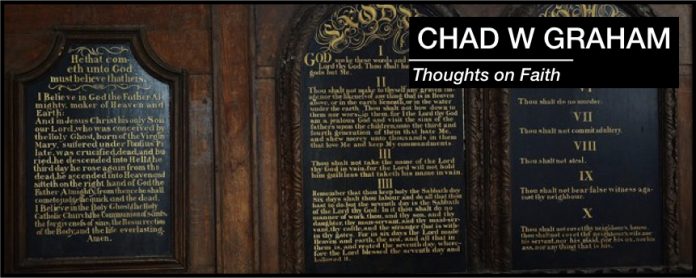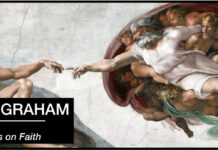I Believe. But what is this faith I have? “I believe in God the Father almighty, creator of heaven and earth. And in Jesus Christ, his only Son, our Lord . . . I believe in the Holy Spirit. . .” Christianity is first and foremost faith in the Triune God. In my Introductory Post, I explained that the Creed reveals the 12 Essential Beliefs which mark a Christian, as a Christian. (see my introduction to the creed). But behind, and throughout each of these beliefs is the great reality of the Triune God.
I Believe in God: The Triune Creator, Word, and Spirit.
We may live in a skeptical and naturalistic age, but statistically, most people still believe in God (Source; Source 2; Source 3). This is unsurprising since it is irrational to deny the existence of the creator of heaven and earth. The Bible describes God’s creative power, with a simple phrase, “God said … and there was…” (see Genesis 1:3). This is repeated in each of the six days of Creation. The Psalmist summarizes things this way, “By the word of the LORD the heavens were made, and by the breath of his mouth all their host” (Psalm 33:6).
God’s creative and sustaining power is seen everywhere. All things that exist are symbols, declaring something of his existence and his nature:
[19] For what can be known about God is plain to them, because God has shown it to them. [20] For his invisible attributes, namely, his eternal power and divine nature, have been clearly perceived, ever since the creation of the world, in the things that have been made. (Romans 1:19–20a)
Plato reads many of the symbols and finds himself drawn to Creator (source). Aristotle as well reads from Creation the necessity of a First Cause (source). Those that are literate in nature simply see God everywhere, though some deliberately close their eyes, and remain in ignorance (Romans 1:18-23). Content to be illiterate, they may benefit from the wisdom of Socrates, who would argue, “the unexamined life is not worth living” (source).
Christian’s read the symbolic language of nature. But, they do not stop there. They move beyond believing in the (necessary) existence of God, to a place where they believe in God. But what does this mean?
I Believe in God: The Triune Creator, Word, and Spirit.
Nearly everyone believes in God, but Christianity alone understands God to be a Just, Holy, Loving, Relational, and Redemptive Trinity:
What do we mean when we call God a Trinity, and why does it matter? For the Christian tradition, the Trinity explains love, life, the universe, and pretty much everything. The word describes God, as a Tri-Unity, a Three and One. The Trinity focuses on the relationship of three divine Persons, in the one divine Being (Learn more: A Crash Course). It sounds pretty conceptual and impractical. However, in the Christian tradition, the Trinity is the most practical and essential of Christian Doctrines (How the Trinity Explains Love, Life, the Universe, and Everything).
Not only do Christians believe God Exists, they have this concrete understanding of who God is. Knowing this God, they believe in him. What does it mean to say we “believe in” something, or someone? This is much more than a profession of mere existence. After all, most people who confess the Creed also believe that the Devil exists. But they do not profess belief in the Devil! The word faith effectively means trust or reliance. Christians believe in God the Father, and in His only Son, our Lord, and in the Holy Spirit.
I Believe in God: The Triune Creator, Word, and Spirit.
It is often said that faith itself is a good thing. But what does this mean? People may say they, “have faith” or “believe,” and by this mean they have a “feeling.” This feeling is empowering and may give hope through hard times. If you ask what that belief is, you may get an answer like that given by the poet D.H. Lawrence: “Forever nameless / Forever unknown / Forever unconceived / Forever unrepresented / yet forever felt in the soul.”
This is not the faith spoken of in the Creed. Instead, Christians trust in a Being. When two people get married, they make promises to one another and put their trust in that other person. That is why adultery is such a great betrayal, it is a betrayal of trust.
Again and again, Jesus urged his followers, “believe in me,” or words to that effect (source). I have always found John 2:23-25 fascinating. It is the paragraph immediate preceding Jesus encounter with Nicodemus. In that encounter, Jesus reminds Nicodemus, “For God so loved the world, that he gave his only Son, that whoever believes in him should not perish, but have everlasting life” (John 3:16).
But, before this popular story begins, there is a prelude. It reads:
[23] Now when he was in Jerusalem at the Passover Feast, many believed in his name when they saw the signs that he was doing. [24] But Jesus on his part did not entrust himself to them, because he knew all people [25] and needed no one to bear witness about man, for he himself knew what was in man. (John 2:23–25)
I Believe in God: But Does He Believe in Me?
Jesus knew what was in man. Man, here, is used of the human race. And what is it that is within? Jesus explained elsewhere that “evils come from within, and these are what defile a man” (Mark 7:23). In his famous illustration of “the Cave,” Plato paints a pretty bleak picture of humanity, by means of an allegory. In it, men are seen chained in a cave. Behind them is a wall, with a fire lit upon it. Between them and the wall, others walk with puppets, which they cast before the fire, making the noises of the animals and things they present.
The shadows of the puppets are seen on the wall in front of the chained men, and they believe that these shadows are the reality. As the allegory continues, one of them is freed. But he has to be both “liberated and compelled suddenly to stand up and turn his neck round and walk and look towards the light.” He then discovers that he has been deceived. He sees reality for the first time.
The story continues. The man is still in a cave, but, at last, “is reluctantly dragged up a steep and rugged ascent, and held fast until he is forced into the presence of the sun himself.” Finally:
he will contemplate him as he is. . . He will then proceed to argue that this is he who gives the season and the years, and is the guardian of all that is in the visible world, and in a certain way the cause of all things which he and his fellows have been accustomed to behold.
I Believe in God: But WIll Others Believe Me?
Plato then asks, what if this man, having seen the truth, remembers his companions and returns to them, to liberate them as well? What do you suppose happens at the end of the parable? The chained men reject him and “say of him that up he went and down he came without his eyes; and that it was better not even to think of ascending; and if anyone tried to loose another and lead him up to the light, let them only catch the offender, and they would put him to death.”
Jesus apostle John, perhaps echoing this allegory steps it up. The sun himself enters the cave. He put it this way:
“[9] The true light, which gives light to everyone, was coming into the world. [10] He was in the world, and the world was made through him, yet the world did not know him. [11] He came to his own, and his own people did not receive him. . .[19] And this is the judgment: the light has come into the world, and people loved the darkness rather than the light because their works were evil.” (John 1:9–11; 3:19)
I Believe in God: But Can He Believe in Me?
Plato was entirely correct about human nature in the Cave Allegory. Jesus knows this truth well. And while “many believed in his name, because of the sign he was doing, . . . Jesus on his part did not entrust himself to them” (John 2:23,24). The words “believed” and “entrust” come from the same Greek root, pistevo (πιστεύω). It means “to consider something [or someone] to be true and worthy of one’s trust, believe” (BDAG).
The Creed calls us to profess to believe in God, God the Father almighty, creator of heaven and earth. And in Jesus Christ, his only Son, our Lord . . . [and] in the Holy Spirit. . . This we must do if we are to be Christians. We must consider the Triune God, to be true and worthy of our trust. Now God cannot lie (Numbers 23:19; Titus 1:2; Hebrews 6:18). He is entirely trustworthy (1 Corinthians 1:9), and every word he speaks is true (John 17:17).
The Shadows of nature reveal the God of the Bible. Seeing him is as glorious as seeing the sun for the first time. The Question is not, is God true. The question turns to us. The unexamined life is indeed not worth living. However, if we examine our lives, will we conclude that God can trust us?
Jesus reminded Nicodemus, “you must be born from above” (John 3:3,7). “Truly, I say to you” Jesus explains, “unless one is both from above, he cannot see the kingdom of heaven” (John 3:3). This new birth, from heaven, “by water and the Spirit” (John 3:5) is the way to be liberated and compelled to leave Plato’s Cave, on the path to enlightenment. One very early Christian leader put it this way around AD 210:
When the soul embraced the faith, being renewed in its second birth by water and the power from above, then the veil of its former corruption is taken away. And it sees the light in all its brightness. It is also taken up by the Holy Spirit. This is in contrast to its first birth. . . (ANF 3.221)






